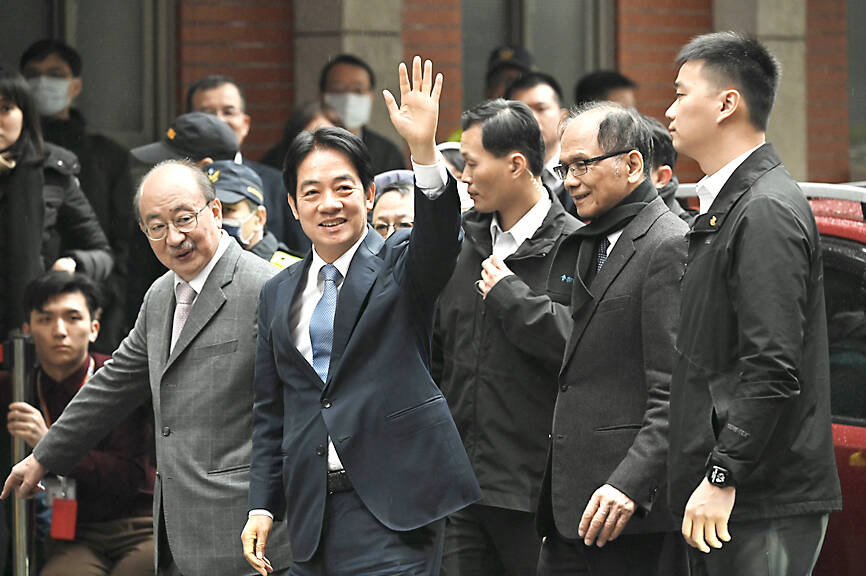More than half of Taiwanese approve of president-elect William Lai’s (賴清德) objection to the so-called “1992 consensus” and “one country, two systems,” a Taiwan Public Opinion Foundation poll showed yesterday.
The landline and mobile phone survey was conducted after the Jan. 13 election from Monday to Wednesday last week, collecting 1,083 valid responses from Taiwanese aged 20 or older.
The poll showed that 53.5 percent of respondents said they agree with Lai’s stance, while 33.6 percent disagreed.

Photo: Tu Chien-jung, Taipei Times
The so-called “1992 consensus” — a term that former Mainland Affairs Council chairman Su Chi (蘇起) in 2006 admitted making up in 2000 — refers to a tacit understanding between the Chinese Nationalist Party (KMT) and the Chinese Communist Party that both sides of the Taiwan Strait acknowledge that there is “one China,” with each side having its own interpretation of what “China” means.
The majority in all age groups supported Lai’s position, although younger respondents were more likely to agree, the foundation said.
Asked whether they feared China would take military action against Taiwan after Lai’s election, 69 percent said they were not concerned that his election would cause China to expedite any potential invasion plans, while 27.3 percent said they were worried.
The results show that suggestions by KMT candidates that a vote for Lai would provoke China did not hold much sway over the public, the foundation said.
Meanwhile, three-quarters of respondents said they disagreed with former president Ma Ying-jeou’s (馬英九) statement before the election that Taiwanese “must trust” Chinese President Xi Jinping (習近平) when it comes to cross-strait issues.
Only 12.5 percent agreed with Ma’s statement.
The poll also showed that 44.2 percent of Taiwanese support independence, 10.9 percent support unification with China and 33 percent support maintaining the “status quo.”
On post-election governance, nearly 60 percent said that the government should form a coalition Cabinet since no party received a majority in the legislature, while 22 percent disagreed.
The poll had a confidence level of 95 percent and margin of error of 2.98 percentage points.

CHAOS: Iranians took to the streets playing celebratory music after reports of Khamenei’s death on Saturday, while mourners also gathered in Tehran yesterday Iranian Supreme Leader Ayatollah Ali Khamenei was killed in a major attack on Iran launched by Israel and the US, throwing the future of the Islamic republic into doubt and raising the risk of regional instability. Iranian state television and the state-run IRNA news agency announced the 86-year-old’s death early yesterday. US President Donald Trump said it gave Iranians their “greatest chance” to “take back” their country. The announcements came after a joint US and Israeli aerial bombardment that targeted Iranian military and governmental sites. Trump said the “heavy and pinpoint bombing” would continue through the week or as long

TRUST: The KMT said it respected the US’ timing and considerations, and hoped it would continue to honor its commitments to helping Taiwan bolster its defenses and deterrence US President Donald Trump is delaying a multibillion-dollar arms sale to Taiwan to ensure his visit to Beijing is successful, a New York Times report said. The weapons sales package has stalled in the US Department of State, the report said, citing US officials it did not identify. The White House has told agencies not to push forward ahead of Trump’s meeting with Chinese President Xi Jinping (習近平), it said. The two last month held a phone call to discuss trade and geopolitical flashpoints ahead of the summit. Xi raised the Taiwan issue and urged the US to handle arms sales to

State-run CPC Corp, Taiwan (CPC, 台灣中油) yesterday said that it had confirmed on Saturday night with its liquefied natural gas (LNG) and crude oil suppliers that shipments are proceeding as scheduled and that domestic supplies remain unaffected. The CPC yesterday announced the gasoline and diesel prices will rise by NT$0.2 and NT$0.4 per liter, respectively, starting Monday, citing Middle East tensions and blizzards in the eastern United States. CPC also iterated it has been reducing the proportion of crude oil imports from the Middle East and diversifying its supply sources in the past few years in response to geopolitical risks, expanding

Pro-democracy media tycoon Jimmy Lai’s (黎智英) fraud conviction and prison sentence were yesterday overturned by a Hong Kong court, in a surprise legal decision that comes soon after Lai was jailed for 20 years on a separate national security charge. Judges Jeremy Poon (潘兆初), Anthea Pang (彭寶琴) and Derek Pang (彭偉昌) said in the judgement that they allowed the appeal from Lai, and another defendant in the case, to proceed, as a lower court judge had “erred.” “The Court of Appeal gave them leave to appeal against their conviction, allowed their appeals, quashed the convictions and set aside the sentences,” the judges